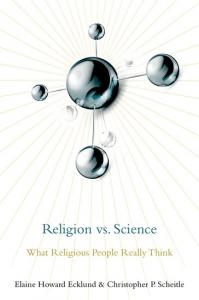 Elaine Ecklund and Christopher Scheitle (Religion vs. Science: What Religious People Really Think) asked religious Americans about their impressions of scientific technology. On many issues (for example, social media technology), most Americans religious or not have similar opinions. The concerns are not particularly theological. When it comes to reproductive technologies the situation changes. There are distinct differences arising from religious beliefs and moral convictions. The reasons are theological, related to the sovereignty of God and his role as creator. Three specific classes of technology were considered: reproductive genetic technologies (RGT), in vitro fertilization (IVF) and human embryonic stem cell research (hESC).
Elaine Ecklund and Christopher Scheitle (Religion vs. Science: What Religious People Really Think) asked religious Americans about their impressions of scientific technology. On many issues (for example, social media technology), most Americans religious or not have similar opinions. The concerns are not particularly theological. When it comes to reproductive technologies the situation changes. There are distinct differences arising from religious beliefs and moral convictions. The reasons are theological, related to the sovereignty of God and his role as creator. Three specific classes of technology were considered: reproductive genetic technologies (RGT), in vitro fertilization (IVF) and human embryonic stem cell research (hESC).
Reproductive genetic technologies can be divided into two groups – those employed to identify (and potentially treat) diseases in utero and those designed to create “designer” people (i.e. manipulate eye color, athletic ability, intelligence and so forth). Over all evangelicals are more likely to find these technologies morally wrong, while those who are atheist, agnostic, or unaffiliated, or from non-western religions are least likely to find them wrong. The differences are significant.
- While only 12% of all Americans find RGT for disease identification morally wrong, ca. 19% of evangelicals, but only 3.3% of atheists, agnostics, and unaffiliated feel this is morally wrong.
- On the other hand most (64% of all Americans) find RGT to produce designer babies morally wrong. But again there are significant differences: 72% of Evangelicals, but only 50% of the non-religious agree that this is morally wrong.
IVF Fertility treatment. In general there is much support for in vitro fertilization as a means to allow infertile couples to have children among religious Americans. Only 13% of Americans classify this as morally wrong (18% of evangelicals and 15% of Catholics). There are serious concerns however on the part of some people. These primarily relate to the fate of the “extra” embryos and the high failure rate. If every embryo is a person, the death rate is unacceptable. Concerns are also raised about sperm or egg donation.
Stem cell research. Concerns with stem cell research also focus on the humanity of a fertilized embryo. While only 47% of all Americans find hESC research morally wrong, 66% of evangelicals and 50% of Catholics find this morally wrong. Again, atheist, agnostic, or unaffiliated Americans are the most accepting of this technology – only 20% find it morally wrong. Those who oppose hESC research have concerns about using one set of humans (or potential humans, i.e. the embryos) for the medical benefit of other humans.
Some religious people interviewed by Ecklund and Scheitle see these technologies “as “playing God” or devaluing the sacredness of human life.” Some went so far as to value suffering as from God, meaning that it wrong to interfere using these technologies to alleviate suffering. (An interesting argument, as most would not forgo medical care or avoid pain-killers such as ibuprofen or acetaminophen on these grounds.) One person interviewed also argued that those who are unable to have children should simply accept it and look to adoption. Infertility is a consequence of “the way we were designed by God.” IVF is playing God and circumventing the natural process of procreation.
These technologies, and others on the horizon today (cloning, genetic editing), raise significant moral questions. Questions that have both moral and theological significance. How can productive conversations be held to evaluate these technologies, their dangers and benefits? These questions are unlike those involving climate change or evolution – where the significant concern is (in my opinion) overcoming the reluctance or resistance of Evangelical and other religious Americans for the good of the church. When it comes to biomedical technologies, the church has an important role to play – one that can only be effective if Christians are educated on the issues involved. Ecklund and Scheitle note that “Scientists need to … recognize that often scientific development of technologies proceeds more quickly than moral reflection on those technologies. At the same time, reflective religious people and thoughtful theologians, in particular, have the potential to act as “moral brakes” against unfettered technological development and use without reflection on the implications.” (p. 133)
To what extent are biomedical technologies “playing God?”
How should Christians get involved in the discussions?
What are productive ways forward?
If you wish to contact me directly you may do so at rjs4mail [at] att.net.
If interested you can subscribe to a full text feed of my posts at Musings on Science and Theology.











